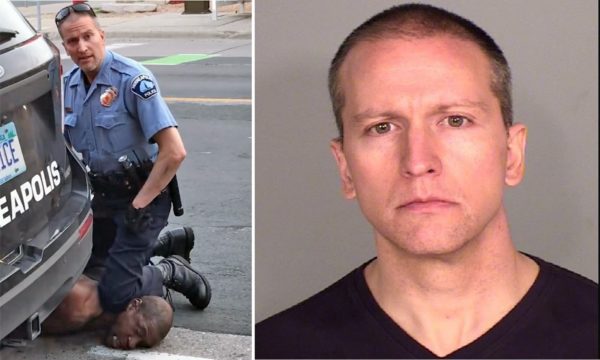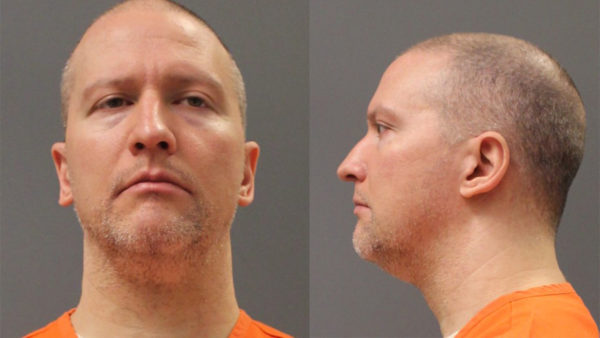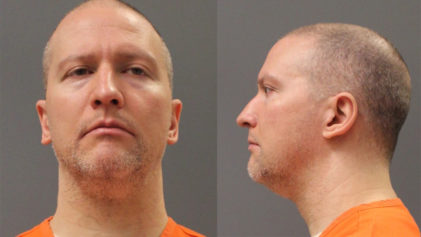Attorneys for the state of Minnesota say Derek Chauvin’s appeal for George Floyd’s murder lacks merit as the former Minneapolis cop argues police officers cannot be convicted of assault because they are allowed to use reasonable force and putting a knee on someone’s neck is not consider deadly.

In the state’s 80-page brief submitted to the court on Sept. 7, private attorneys and prosecutors respond to “an industrial kitchen sink’s worth of arguments” by Chauvin’s lawyer, asking to either reverse his conviction, give him a trial in a new location or resentence him.
The state contends that the defense’s brief is “riddled with factual errors, half-truths, and inaccuracies large and small. The State cannot respond to each individually. But consider this: Chauvin still maintains that ‘[p]utting your knees on the back of a suspect’ cannot kill someone.’ ”
Chauvin was sentenced to 22-and-half years in state prison in June 2021 after a jury found him guilty of second-degree unintentional murder, third-degree murder and second-degree manslaughter in April 2021. Floyd’s death, which was witnessed by the world through cellphone footage, amplified tensions between the Black community and law enforcement and sparked outrage over excessive force, leading to riots and longstanding protests.
Chauvin’s attorney William Mohrman argued that the media attention around the case, the riots and the announcement of a settlement with the city a month before the trial created prejudice in the case. Mohrman also contended that the media was “overwhelming hostile to Chauvin and law enforcement in general” and “the threat of violence” from an acquittal was “plain.”
State lawyers answered Mohrman’s accusations that the jury showed bias against Chauvin. The defense attorney claims that a juror lied about having a negative view of Minneapolis police but later stated in a radio interview that he had 50 encounters with the police agency.
Mohrman also alleges that another juror said she had feared for her safety regardless of the verdict and said after the trial that she was only concerned about her safety if the verdict was not guilty.
“Chauvin faults the District Court for failing to hold a hearing to investigate speculation that a juror lied in voir dire. But that juror was forthright in a questionnaire and testimony and had no reason to lie,” the state argued.
The “most telling” argument that Chauvin’s charges should stick, according to the state, is “Chauvin says the quiet part out loud, and argues that police officers cannot ever be convicted of assault. But the law authorizes officers only to use reasonable force. When officers use unreasonable force, the law holds them responsible.”

Mohrman wrote that “because police officers are duty bound to ‘assault’ suspects resisting arrest, Minnesota’s assault statute becomes a strict liability statute for a police officer because the officer always ‘intends’ to physically touch the suspect.”
The defense attorney also argued that Chauvin’s intent was not a question during the trial and “in order for a police officer to be convicted of murder, Minnesota statutes require the officer to be using ‘deadly force’ –– force that would cause either death or ‘great bodily harm.’”
Court documents show that on May 25, 2020, Chauvin pressed his knees into Floyd’s neck, back, and side of his chest. The former officer weighed down on the man for nine minutes and 29 seconds while he was face down on the street.
“Putting your knees on the back of a suspect does not create a ‘substantial risk of causing, death or great bodily harm,” Mohrman argued.
In his 72-page filing, Mohrman said that protestors assaulted Chauvin’s co-defendants’ attorneys outside a courthouse. He also argues that local prosecutors improperly met with the medical examiner. He challenged evidence and made other claims of misconduct by prosecutors.
However, the state’s lawyers said Chauvin received one of the most transparent trials in the state. It was fair, and his sentence was just, they wrote.
“Notwithstanding the fact that Chauvin also placed his knee on Floyd’s neck, Chauvin’s assertion—and others like it—is flat out untrue. As copious evidence proved, and as the jury found, restraining a person prone can cause positional asphyxia,” the state responded. “Law enforcement has long known about positional asphyxia. Chauvin was specifically trained to avoid it. That is how George Floyd died. The truth matters.”


